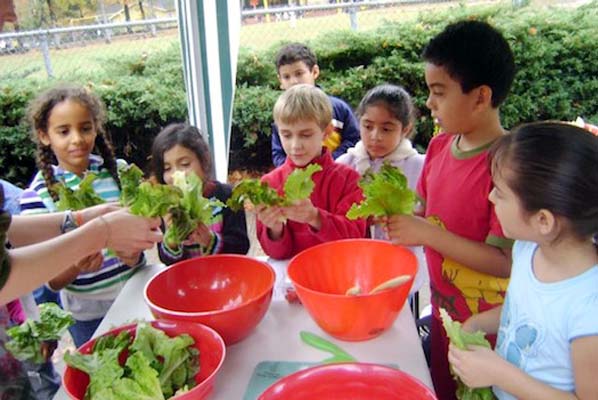
Hannah Boyd :
If Alice Waters has her way, the soggy chicken strips and overcooked peas served in school cafeterias will go the way of corporal punishment and McGuffey’s readers. Waters founded the Edible Schoolyard at Martin Luther King Junior Middle School in Berkeley, California in 1995, reasoning that inner-city kids would benefit from growing their own food. Twelve years later, the movement she started is spreading across the nation.
The Edible Schoolyard had a radical premise: that kids used to a steady diet of processed foods could learn to grow and eat organic produce, doing everything from tilling the soil to preparing the meals.
And it worked. An abandoned asphalt lot was turned into a garden plot, the old cafeteria was turned into a teaching kitchen, and the revolution was underway. Kids at MLK now take classes in gardening and cooking, share meals with teachers, and turn the scraps into compost.
Sounds great, you may be thinking, but why bother when schedules are already packed and produce is readily available in stores?
First, the obvious: fresh, organic foods are healthier than the processed junk served in most school cafeterias. In a society where kids are increasingly likely to be obese and parents have less and less time to prepare meals at home, a healthy lunch counts for a lot – and kids who help grow and prepare whole grains and produce are more likely to eat them, too. Plus, enthusiastic kids often talk their parents into starting gardens at home, spreading the magic. And did we mention that planting, weeding and picking are great exercise?
Second, “seed to table” planting provides a great lesson in ecology and personal responsibility. Kids learn how to provide for their own needs while respecting the earth. They eat with the seasons, and learn about nutrition and the cycle of life. Farming requires teamwork and provides the opportunity to see a project through from its beginning to the very end; it’s a revelation to kids who think corn comes in cans and lettuce in bags.
Best of all, it can be adapted to the needs of any group. In Tucson, Arizona, the Pascua Yaqui tribe suffers from skyrocketing rates of diabetes and obesity.
They’re trying to turn that around by teaching kids how to plant traditional crops for use in the school kitchen. In Boulder, Colorado, the Cultiva! Youth Project teaches kids between 13 – 18 years old how to raise organic produce and sell it at a local farmers’ market. In Chicago, the Dawes School Edible Garden Project provides raised beds to an ethnically diverse group of elementary school students, who raise, prepare and eat fresh produce.
If Alice Waters has her way, the soggy chicken strips and overcooked peas served in school cafeterias will go the way of corporal punishment and McGuffey’s readers. Waters founded the Edible Schoolyard at Martin Luther King Junior Middle School in Berkeley, California in 1995, reasoning that inner-city kids would benefit from growing their own food. Twelve years later, the movement she started is spreading across the nation.
The Edible Schoolyard had a radical premise: that kids used to a steady diet of processed foods could learn to grow and eat organic produce, doing everything from tilling the soil to preparing the meals.
And it worked. An abandoned asphalt lot was turned into a garden plot, the old cafeteria was turned into a teaching kitchen, and the revolution was underway. Kids at MLK now take classes in gardening and cooking, share meals with teachers, and turn the scraps into compost.
Sounds great, you may be thinking, but why bother when schedules are already packed and produce is readily available in stores?
First, the obvious: fresh, organic foods are healthier than the processed junk served in most school cafeterias. In a society where kids are increasingly likely to be obese and parents have less and less time to prepare meals at home, a healthy lunch counts for a lot – and kids who help grow and prepare whole grains and produce are more likely to eat them, too. Plus, enthusiastic kids often talk their parents into starting gardens at home, spreading the magic. And did we mention that planting, weeding and picking are great exercise?
Second, “seed to table” planting provides a great lesson in ecology and personal responsibility. Kids learn how to provide for their own needs while respecting the earth. They eat with the seasons, and learn about nutrition and the cycle of life. Farming requires teamwork and provides the opportunity to see a project through from its beginning to the very end; it’s a revelation to kids who think corn comes in cans and lettuce in bags.
Best of all, it can be adapted to the needs of any group. In Tucson, Arizona, the Pascua Yaqui tribe suffers from skyrocketing rates of diabetes and obesity.
They’re trying to turn that around by teaching kids how to plant traditional crops for use in the school kitchen. In Boulder, Colorado, the Cultiva! Youth Project teaches kids between 13 – 18 years old how to raise organic produce and sell it at a local farmers’ market. In Chicago, the Dawes School Edible Garden Project provides raised beds to an ethnically diverse group of elementary school students, who raise, prepare and eat fresh produce.

